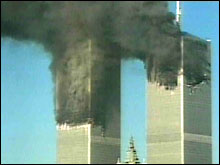|
Wall Street has resilience
|
 |
September 11, 2001: 4:14 p.m. ET
In the past, U.S. stocks have bounced back from terrorist attacks
|
NEW YORK (CNNfn) - It will be a long while before business gets back to normal on Wall Street after Tuesday's devastating terrorist attack, but a review of market history shows that acts of terrorism against the United States have had limited impact on the Dow Jones industrial average.
When bombs rained on U.S. embassies in Kenya and Tanzania on Aug. 7, 1998, the Dow ended the day up 0.24 percent. By the end of the week, the index had given up 3 percent, according to Ned Davis Research, a Florida market research firm.

|
|
|
World markets are recoiling from terrorist attacks in New York and Washington. But history shows such acts have had little impact on the Dow. | |
And when terrorists bombed the World Trade Center on Feb. 26, 1993, the Dow closed up 1 percent that day and was up 0.15 percent by the end of the week.
"It's more of a psychological event than an economic event," said Robert Rodriguez, manager of FPA New Income Fund and FPA Capital Fund, whose career on Wall Street spans about 30 years.
Stock markets in New York remained closed after two jet planes crashed into the World Trade Center's twin towers Tuesday, causing the towers to collapse. At about the same time, another aircraft hit the Pentagon in the worst terrorist attack in American history.
A look back at the Dow
Up until the World Trade Center bombing in 1993, terrorists had never made their mark on U.S. soil, but had struck a number of U.S. targets overseas.
On Oct. 23, 1983, the Dow rose 0.1 percent after terrorists bombed U.S. Marine barracks in Beirut, killing 241 people and injuring another 80. The index closed down 2.05 percent by the end of the week, Ned Davis Research said. (Click here to see some other events through history that have affected the Dow).
The Dow edged down 0.64 percent on June 26, 1996 after bombs hit a U.S. military base in Saudi Arabia, killing 19 Airmen. By week's end, the index was off 0.5 percent.
Acts of war by the United States have also helped trigger market rallies, according to Ned Davis Research. For example, the three-week Gulf War pushed the index down 4.3 percent as of Jan. 16, 1991. But a month later, the Dow was up 17 percent. In three months, the index had gained 19.8 percent, and after six months, it was up 18.7 percent.
But the Japanese attack on Pearl Harbor on Dec. 7, 1942, which launched U.S. involvement in World War II, sent the Dow down 6.5 percent in four days through Dec. 10, 1941, Ned Davis Research said. In that case, the Dow rebounded after a month for a gain of 3.8 percent, then it suffered over the following year. In three months it was down 2.9 percent, and after six months it was off 9.6 percent.
The Korean War also took its toll on the Dow, but in a different way, figures show. In the three weeks up to July 13, 1950, the index lost 12 percent. But over one month it gained 9.1 percent; over three months, 15.3 percent; and over six months, 19.2 percent.
Click here for the latest on the attacks from CNN.com
The New York Stock Exchange cites more than a dozen historical events that have moved the market, including the Arab oil embargo of October 1973, and Iraq's invasion of Kuwait in August 1990.
The Dow dropped its steepest level in 10 years when Arab nations cut oil shipments to the United States on Oct. 19, 1973, according to the NYSE. Stocks and bonds hit their year low after Iraqi troops entered Kuwait on Aug. 3, 1990, the exchange said. 
|
|
|
|
|
 |

|

